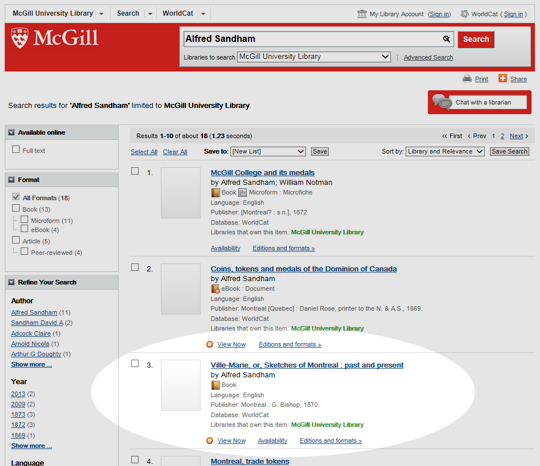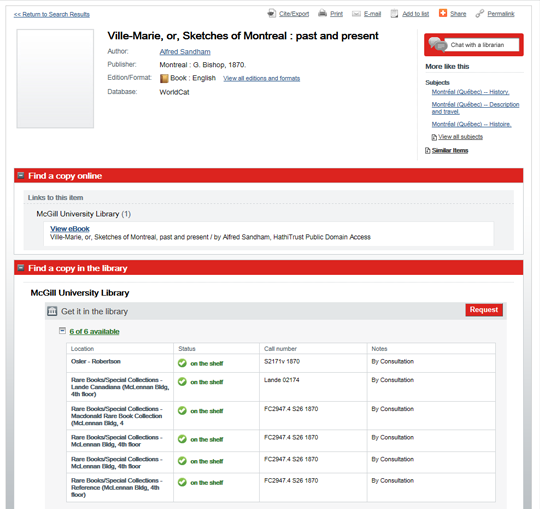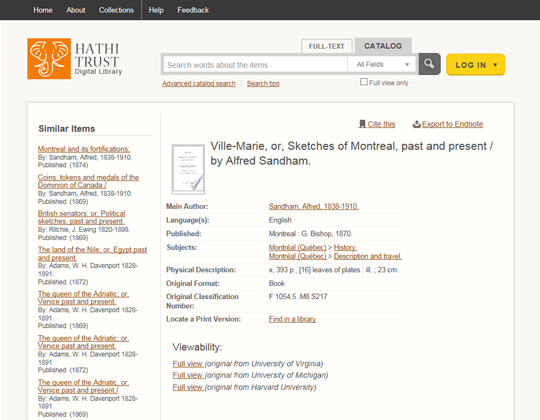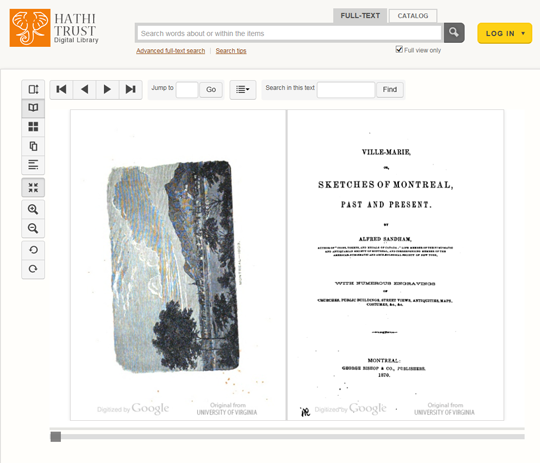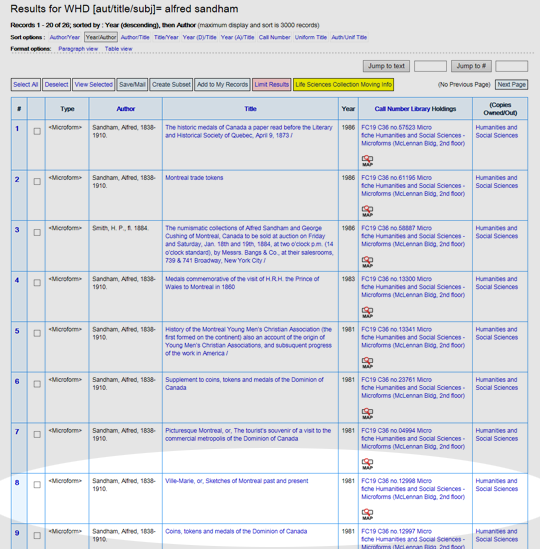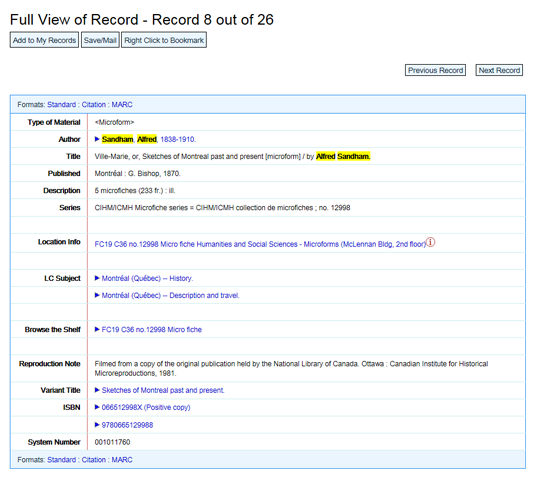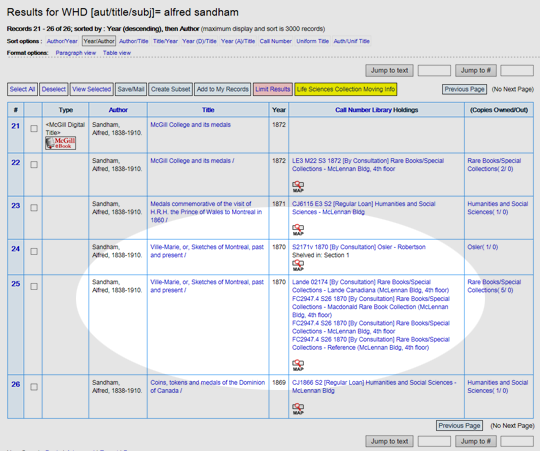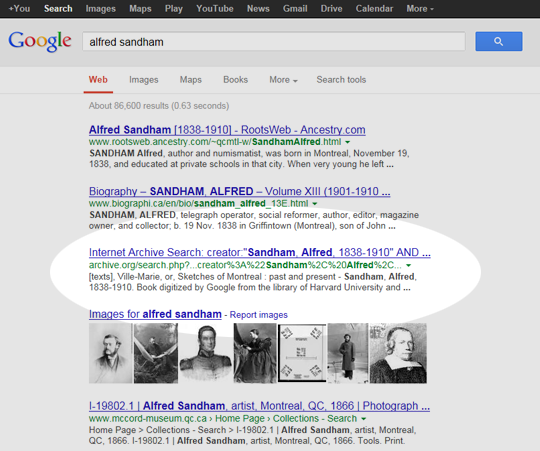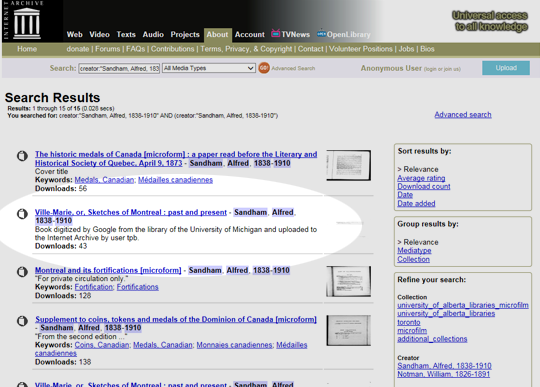This past weekend I was reading a book on the history and architecture of Old Montreal, and I came across a reference to a Alfred Sandham, a Montrealer who wrote about life in the young city in the mid- to late-nineteenth century. According to the book I was reading, Sandham’s most well-known work was Ville-Marie, or, Sketches of Montreal : past and present, which was published in 1870. Interested, I thought I would see if we had a copy at the Library.
I picked up my tablet, navigated to the Library home page, and typed “Alfred Sandham” in the search box that appears there. That search box searches against our WorldCat Local discovery layer, and I was interested in seeing how well it handled my search.
As it turns out, Ville-Marie showed up third in the list of search results that were displayed.
I was expecting to have to filter by type or redo the search as a title search, but the author name appeared to be enough to pull up what I was looking for. I clicked on the record to see how I could get my hands on the book.
As you can see, the WorldCat record shows that we have several copies of the work, but all of them in our rare collections and available for in-library consultation only. If this book was central to research I was doing, and if I was looking for a reason to spend a few hours nestled amongst our finest books, this would have been enough for me. However, my interest is more personal and my time too limited. I was hoping to have a copy I could take out and browse when I had a spare moment here and there.
Fortunately, I noticed that under Find a copy online, there is a link to an online version of the book that we have access to through Hathi Trust.
According to the “viewability” section of the Hathi record, there are three digitized copies of the work: one from the University of Virginia, one from the University of Michigan, and one from Harvard University. Clicking on any one of these brings be to the digitized copy of the book displayed in page.
Note that if I login to Hathi Trust (using my McGill username and password, thank you shibboleth!), I can also download the full PDF of the book if I so desire.
I thought I would compare this search experience with what would have happened had I searched for the item in our Classic Catalogue.
(I’m doing this not to disparage the Classic Catalogue: for some use cases, it is the right tool for the job. What I want to suggest through this example is that for some cases, and maybe many cases, WorldCat (or another discovery tool) does/can do a better job of providing our users with access to the information they are seeking.)
So, the Classic Catalogue. I go to the default search box and type in “alfred sandham”.
The first entry for Ville-Marie is eighth in the list, but it says “microform” next to it. I click through anyway, but I only see more information about microfiche, and nothing about print or electronic copies that might be available.
Let’s assume that I know what microform/fiche means, and I also decide that there must be a print copy at the Library, and that I just haven’t found it yet. I go back to the search results and keep scanning. Nothing else on page one, so I go to page two of the results.
There I see that there are print copies available, but they are by consultation only. No mention of an electronic version anywhere.
As I said before, the are certain situations where a patron will make the effort to visit Rare Books and Special Collections (or Osler) and sit and read the book on site. But not many. Or rather, if that this is only way people believe they can access this book, then I am reducing the potential use of that book considerably.
As a third point of comparison, I’ll repeat the same search with Google. If I search for “alfred sandham”, I notice in the description of the third item in the search results the title of the book I am interested in (Ville-Marie).
It is a link to the Internet Archive, which takes me to a list of books by Alfred Sandham. The second item in the list is the University of Michigan’s digitized copy of the text (which being in the Internet Archive has the extra bonus of being available in many formats including epub).
So Google fares quite well in handling this search as well… I do wonder how well Google would work, though, with a restricted resource (i.e. something not freely available online or in electronic format). I think I’ll have to save that for a future post!
In any case, for me last weekend, the ability to plug in the author’s name and within a few clicks be browsing an electronic version of the book I was interested in was certainly a positive user experience, and one that I wanted to share if only to provide an example of what is possible and what we are working towards.
Note: I refer to WorldCat here but my comments could easily be in support of other discovery layers as well. WorldCat, like any system, has its limitations and problems, and like any library, we are constantly working to make things better.


